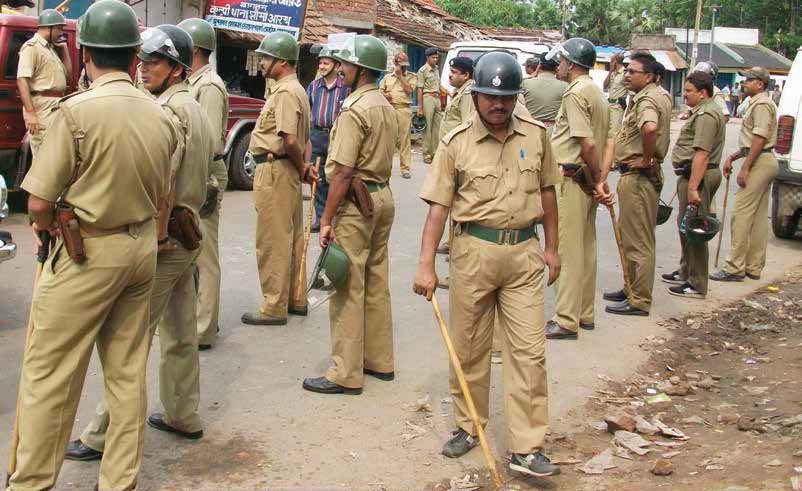This article is written by Lavanya Gupta, a student at University School of Law and Legal Studies, GGSIPU, Delhi. This article seeks to analyse the offence of adultery and its repercussions in the Indian legal system.
It has been published by Rachit Garg.
Table of Contents
Introduction
The offence of adultery constitutes an offence against marriage. In layman’s terms, adultery is having intercourse with a person outside one’s marriage, i.e., with someone other than one’s spouse.
Earlier, the commission of adultery made one criminally liable under Section 497 of the Indian Penal Code, 1860, but the constitutionality of the same was challenged in the case of Joseph Shine v. Union of India (2018), where the Supreme Court declared this Section unconstitutional and struck it down.
Presently, adultery is a ground for divorce under family law. The offence of adultery, however, is dealt with differently in cases where one’s spouse happens to be a member of the armed forces and carries a liability with it.
The concept of adultery under the IPC
Section 497 of the Indian Penal Code, 1860, defines the offence of adultery. This provision covers both the ingredients as well as the punishment for adultery.
Ingredients of the offence of adultery
This offence covers sexual intercourse by a man with the wife of another man. The mens rea under this offence is signified when the man knows or has a reason to believe that the woman is married.
Exceptions to the offence of adultery
The man would not be liable for the offence of adultery if the act was done with the consent or connivance of the husband.
If the intercourse occurs without the consent of the woman and therefore amounts to rape, then such intercourse would not fall under the offence of adultery. The Section specifies that the wife would not be liable as an abettor.
Punishment for the offence of adultery
The punishment given under Section 497 is imprisonment for a term extending to five years, a fine, or both. However, as mentioned above, this Section was struck down by the Supreme Court of India in the landmark case of Joseph Shine v. Union of India (2018) and is therefore not applicable today. This case has been discussed in detail below.
The history and evolution of adultery laws in India
The adultery law in India was formally laid down as a part of the Indian Penal Code, 1860, under Section 497 during British rule, and it was carried forward as a part of the IPC post-independence.
In 1837, the offence of adultery was not included in the first draft of the Indian Penal Code by the Law Commission of India because, according to its principle initiator, Lord Macaulay, it was better dealt with by the community. The second law commission, observing the state of women in our country, decided to add the offence of adultery in an attempt to provide security to married women.
It was in the 20th century that this Section was questioned on the basis of its containing elements of gender discrimination. The basic ideology of this law was rooted in the patriarchal concept that a woman was her husband’s property and that it was the husband alone who could be a victim of adultery. It can be deduced clearly from the language of the Section that the role of a wife in an adulterous relationship was not given much importance. Women at the time of enactment of the law on adultery were not given any rights separate from their husbands in a marriage and were treated as the property of their husbands, the offence of adultery was essentially the stealing of the ‘husband’s property’ from him and therefore a crime against the husband.
This raised two questions: first, would the wife be punished for committing an act of adultery? And second, will the wife have a criminal remedy against her adulterous husband?
Landmark judgements on punishment for adultery in India
Smt. Sowmithri Vishnu v. Union of India (1985)
This Section was first challenged before the Supreme Court in the case of Smt. Sowmithri Vishnu v. Union of India in 1985. In this case, the petitioner was accused of adultery by her husband during their divorce. The Section was challenged by the petitioner on the grounds that it is violative of Article 14, i.e., the right to equality, of the Constitution of India, as it makes an unjustified distinction between men and women by allowing the husband certain rights that the wife cannot exercise. Further, it was contended that this Section did not allow the wife to prosecute an adulterer, whereas the husband is free to prosecute the adulterer, and that the Section does not allow the wife to take any action against a husband committing adultery. Specifically, in cases where the husband has an adulterous relationship with an unmarried woman, he basically faces no punishment and therefore gets a free licence to have the extramarital affair.
This Section was also challenged on the grounds of Article 21, i.e., the right to life, as the wife has a right to reputation, and this Section, by not considering the wife as a necessary party, disallows the wife to plead her case and therefore takes away her right to be heard.
The Court, however, rejected this petition on the contention that diluting the adultery laws would be against the sanctity of the institution of marriage.
Joseph Shine v. Union of India (2018)
The case that actually led to the decriminalisation of adultery was the 2018 case of Joseph Shine v. Union of India.
The petition filed in this case challenged both Section 497 of the IPC and Section 198(2) of the Criminal Procedure Code, 1973, before a five-judge bench of the Supreme Court.
Section 198(2) of the CrPC states that ‘no person except for the husband of the woman will be the aggrieved party under Section 497 or 498 of the Indian Penal Code. If the husband is not available but has left his wife in the care of someone, then the person who had the care of the wife can file a complaint on behalf of the husband with the leave of the court.
The Court held that Section 497 was unconstitutional and violated Article 14 (right to equality), Article 15 (prohibition of discrimination on the grounds of religion, race, caste, sex, place of birth, or any of them), and Article 21 (right to life). It was also held that Section 497 took away the autonomy of women and their right to privacy and dignity. The Court reaffirmed that sexual privacy was a natural right of a woman and that this Section placed undue importance on the role of a husband in the context of adultery, essentially resulting in the subordination of the wife.
It was further held that Section 497 disregarded the concept of equality and implied that women were not equal partners in a marriage and were not capable of giving their consent independently to sexual activity, therefore making them the property of their husband.
The Government contended that dilution of adultery in any form would impact the sanctity of the marriage, to which the Court stated that adultery would remain within the ambit of family law and therefore a civil wrong because essentially criminal wrongs are those committed against society at large. Criminalising adultery signifies a crossover of personal rights in the public domain, which should be kept separate. Therefore, the law on adultery will not get diluted, it would simply become a remedy equally available to both parties in marriage.
Current position of adultery in India
Under the civil laws
The act of adultery is a ground for dissolution of marriage through divorce and can also result in the wife getting less or no maintenance from the husband if she is the guilty party.
Under Hindu law
As per Section 13(1) of the Hindu Marriage Act, 1955, adultery is a ground for divorce. According to this Section, adultery is voluntary sexual intercourse outside one’s marriage. Earlier, the grounds for divorce and judicial separation were different, the ground for adultery was not a ground for divorce; however, the Marriage Laws (Amendment) Act (1976). included adultery as a ground for divorce. Before the amendment, adultery was a ground for judicial separation as per Section 10 of the Hindu Marriage Act, 1955.
Under Muslim law
Under Muslim law, the concept of adultery is dealt with under the concept of lian. The concept of lian does not deal directly with adultery but rather with the concept of allegations of adultery. If the husband alleges that his wife committed adultery, he has two options, as per the Dissolution of Muslim Marriage Act, 1939, which allows the husband to withdraw his allegations, but if it is proved in court that the allegations were false, the wife is entitled to get a decree of lian. The Muslim law deals with adultery, though not in those exact terms, under Section 2(viii)(b) of the Dissolution of Muslim Marriage Act, 1939, which states that a wife can sue her husband on the ground of cruelty if he leads an ill famed life or associates himself with a woman of evil repute, which may cover adultery in its purview. Cruelty, as per Section 2 of this Act, is a ground for divorce.
Under Christian law
Under Christian law, there are two methods of dealing with adultery. In the first, the aggrieved spouse can file for a judicial separation under Section 22 of the Indian Divorce Act, 1869. Whereas, in the second method given under Section 11 of this Act, the wife can apply to the courts after obtaining an annulment from the church where the marriage was performed and make the adulterer a co-respondent in the case; however, the wife is supposed to prove a ground in addition to adultery, for example, cruelty, along with it, whereas it is sufficient for a husband to just prove adultery on the part of his wife.
The Bombay High Court in the case of Pragati Varghese v. Cyril Georg (1997) allowed adultery to be the independent ground to obtain a divorce for a woman.
As per Section 27 of the Special Marriage Act, 1954, adultery is an independent ground for obtaining a divorce. As per subsection 4 of Section 125 of the Criminal Procedure Code, 1973, which covers the maintenance of wives, children, and parents, the wife would not be entitled to receive an allowance if it is proved that she is living in adultery. The concept of granting divorce in India is based on the fault theory, and by not allowing the wrongdoer, in this case a wife committing adultery, to take maintenance from the husband, it can be construed as a financial repercussion for the act committed.
In the case of military personnel

The offence of adultery was decriminalised in 2018, and after this verdict, the Central Government approached the Supreme Court on November 5, 2020, seeking clarification on whether this judgement exempted the armed forces from its purview.
In the armed forces, adultery is covered under Section 45 and Section 46 of the Army Act, 1950. Section 45 deals with the actions of the armed officer unbecoming of the position being served by him, i.e., conduct not expected from a person of his station, as the officers are supposed to be disciplined and respectable in their conduct to maintain the sanctity of their position. According to Section 45, such a person can be cashiered, i.e., dismissed from service on the charges of misdemeanour, and if he is a junior officer or a warrant officer, he is liable to be dismissed. Whereas, Section 46 of the Army Act makes the officer liable for imprisonment up to 7 years due to disgraceful conduct of an indecent nature as given under clause (a), which may include committing adultery.
Though these sections deal indirectly with the offence, in the armed forces, the act of adultery is known as ‘stealing the affections of the wife of a brother’. The army relies on ideals of strict moral character and discipline as essentials to its service and to be upheld by anyone who is a part of the army; therefore, to prevent dissent among the unit and foster a feeling of unity among comrades, it views adultery as disgraceful conduct and punishes it accordingly.
The present stand of the Supreme Court with respect to adultery laws in the army is that this aspect has not come up before the court as of now. The Joseph Shine judgement of 2018 only dealt with the decriminalisation of adultery for civilians and therefore did not include the defence forces in its purview.
Therefore, the army law will remain as it is unless it is challenged by an army officer, allowing the court to consider the question of adultery being criminally punishable under the Army Act, 1950. As of now, the army can take action against a person committing adultery.
Conclusion
In conclusion, it can be said that Section 497, which covered adultery, which was a criminal offence earlier, has now been declared unconstitutional by the Supreme Court in the Joseph Shine judgement. This leaves a person who is aggrieved by adultery with only the option of civil recourses, like using it as a ground for divorce or judicial separation as per the family laws, and for the reduction of maintenance to be paid under Section 125 of the CrPC.
This position is, however, not uniform throughout the country because the army still holds the power to criminally punish its officers for committing adultery.
The Supreme Court, while responding to the clarification sought by the government, mentioned that the question of adultery laws and their applicability in the armed forces is a topic that was not analysed in the Joseph Shine case, and the status of adultery laws in the army will remain as is but is open to being challenged in the future.
It must, however, be noted that the army punishes both male and female officers for adultery, thereby making this law equally applicable to both genders; therefore, the grounds invoked in the Joseph Shine case are more or less not applicable to army adultery laws.
The 2018 verdict of the Supreme Court was considered a win for gender equality laws and a step in the direction of truly recognising the principle of equality as enshrined in Article 14 of the Constitution.
Frequently asked questions (FAQs)
Is adultery a criminal offence in India?
It is decriminalised only for civilians and not for army personnel, who are dealt with by army marshals and courts.
How can adultery be proved in court in India?
Circumstantial evidence can be used as proof of adultery, such as the spouse getting pregnant when the husband had no access to her or the spouse contracting a venereal disease.
Are there any types of adultery?
Yes, adultery is of two types, if done with an unmarried person, it is single adultery, and if done with a married person, it is double adultery as it now carries two counts of adultery.
What is the definition of adultery now?
After the 2018 verdict, it is left to be seen whether the definition of adultery as given in Section 497 will be used as a reference, which only involves intercourse, or if the definition can be widened to involve other acts of a sexual nature as well. As of now, only intercourse is considered under the definition of adultery.
What action can be taken if a husband lives with another woman without divorcing his first wife?
The first wife can file an application for divorce before the family court on the grounds of adultery and desertion.
Does adultery amount to mental cruelty?
Even though the Supreme Court in the case of K.V. Prakash Babu v. State of Karnataka (2016) held that extramarital relationships per se would not amount to cruelty, the Madras High Court in the case of Dhananchezhiyan v. the State of Tamil Nadu (2020) held that in the light of facts and circumstances, extramarital affairs can amount to mental cruelty on a case to case basis, and the husband can be punished for the same under Section 498A of the Indian Penal Code, 1860.
References
- https://feminisminindia.com/2022/11/30/why-was-the-adultery-law-anti-women-a-look-back-at-its-history-supreme-courts-verdict/
- https://www.indiafilings.com/learn/adultery-a-ground-for-divorce-in-india/
- https://indianexpress.com/article/india/army-adultery-punishments-legal-challenge-military-legal-experts-decriminalisation-of-adultery-8418814/
- https://www.researchgate.net/publication/296877247_Adultery_and_the_Indian_law
- https://www.ijlmh.com/paper/a-critical-analysis-on-decriminalizing-adultery/
- https://www.jlsrjournal.in/critical-study-of-decriminalisation-of-adultery-in-india-by-sidrah-jami/
Students of Lawsikho courses regularly produce writing assignments and work on practical exercises as a part of their coursework and develop themselves in real-life practical skills.
LawSikho has created a telegram group for exchanging legal knowledge, referrals, and various opportunities. You can click on this link and join:
Follow us on Instagram and subscribe to our YouTube channel for more amazing legal content.
 Serato DJ Crack 2025Serato DJ PRO Crack
Serato DJ Crack 2025Serato DJ PRO Crack









 Allow notifications
Allow notifications


